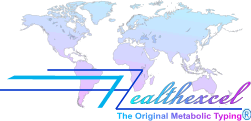
Since 1987 |
Maximize Your Phenotype
Native Climate and Human Energy Production
With Commentary by
W.L. Wolcott
NEW YORK (Reuters Health) - A person's native climate might influence how his
or her body goes about burning calories, according to a study published Monday.
People whose ancestors hail from chilly regions have gene adaptations that may allow their bodies to produce more heat while burning calories, an international team of researchers reports, while those with roots in warmer climates use calories more efficiently and produce scant excess heat.
Mitochondria, found in every cell, are responsible for producing energy and play a key role in regulating metabolism. The DNA in mitochondria is inherited maternally, and shows "striking differences" from one geographic region to another, Douglas C. Wallace from the University of California at Irvine and colleagues note. To investigate whether adaptation to different climates might explain this variation, the researchers analyzed gene sequences from the mitochondria of 104 people who represented all the known major types of mitochondrial DNA.
In the Proceedings of the National Academy of Sciences paper, Wallace and his team report that mitochondrial gene variants may confer advantages in some climates, but disadvantages in others.
For instance, arctic and sub-arctic native peoples had variants that programmed them to produce more heat, but put out less energy. Their bodies were thus more efficient at keeping them warm. Previous studies have shown that indigenous populations around the North and South Poles tend to have a higher resting metabolism.
Tropical and sub-tropical natives made more efficient use of energy, producing little heat.
The authors say the variants are evidence of natural selection at work--that genes evolved in response to environmental stresses.
But this adaptive response might not be beneficial when people native to one climate relocate to another climate, the authors say. "Given that mitochondrial DNA lineages are functionally different, it follows that the same variants that are advantageous in one climatic and dietary environment might be maladaptive when these individuals are placed in a different environment," they write.
Natives of cold regions are used to stoking their bodies with heat-producing high-calorie meals. That dietary habit might not serve them well if they move to a warmer region, and may play a role in causing disease, the authors say.
"Ancient regionally beneficial mitochondrial DNA variants could be contributing to modern bioenergetic disorders such as obesity, diabetes, hypertension, cardiovascular disease, and neurodegenerative diseases as people move to new regions and adopt new lifestyles," they write.
Proceedings of the National Academy of Sciences 2002;10.1073/pnas.0136972100
COMMENT BY: William Wolcott
Founder, The Healthexcel System of Metabolic Typing®
Author,
The Metabolic Typing Diet
(Doubleday, 2000)
This study lends credence to our philosophy of Metabolic Typing® of the last 40 years that we are as unique on a biochemical level as we are in our fingerprints. People differ in how their bodies metabolize nutrients. What constitutes a healthy diet for one Metabolic Type® may produce pathology in a different Metabolic Type® . Forces of natural selection, genetic mutation, and survival of the fittest assured that the indigenous people of a certain geographical and climatic region became perfectly adapted to the foods in their environment. This same scenario played itself out throughout the planet.
The author's statement, "...the same variants that are advantageous in one climatic and dietary environment might be maladaptive when these individuals are placed in a different environment," echoes the research of metabolic typing pioneer George Watson, Ph.D. Watson spent some 30 years objectifying indicators of what he termed Fast Oxidizers and Slow Oxidizers. Watson found that Fast Oxidizers metabolized carbohydrates too quickly and as a result tended toward an acid blood pH and thereby thrived on a diet high in proteins and fats and low in carbohydrates. Slow Oxidizers with an alkaline blood pH required a diet high in carbohydrates and low in proteins and fats in order to acidify the blood. Watson further showed that the right diet for the Metabolic Type® resolved health issues but that when the diets were transposed, pathologies worsened.
Each of us today carries the genes of our ancestors and the genetic predisposition to thrive on certain foods and decline on other foods. The secret of the right diet for each person depends not on whim, fancy or philosophy but is irrefutably dictated by our genes. Eating right for your Metabolic Type® should be the foundation of any quest for good health.
